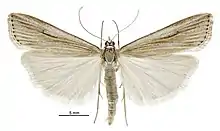Scoparia panopla
Scoparia panopla is a species of moth in the family Crambidae.[2] It is endemic to New Zealand.[1]
| Scoparia panopla | |
|---|---|
 | |
| Female | |
 | |
| Male | |
| Scientific classification | |
| Domain: | Eukaryota |
| Kingdom: | Animalia |
| Phylum: | Arthropoda |
| Class: | Insecta |
| Order: | Lepidoptera |
| Family: | Crambidae |
| Genus: | Scoparia |
| Species: | S. panopla |
| Binomial name | |
| Scoparia panopla | |
Taxonomy
This species was named by Edward Meyrick in 1884.[3][4] Meyrick gave a description of the species in 1885.[5] However the placement of this species within the genus Scoparia is in doubt.[1] As a result, this species has also been referred to as Scoparia (s.l.) panopla.[2]
Description
The wingspan is about 31 mm for males and 25 mm for females. The forewings are brownish-ochreous, irrorated with white on a streak along the costa. There is a sinuate streak from the middle of the disc to the hindmargin, as well as a narrow black streak from the base along the submedian fold to the middle. The veins between the apex and anal angle are posteriorly marked with blackish streaks, as well as a hindmarginal row of blackish dots. The hindwings are grey-whitish, with a narrow, somewhat darker hindmarginal band. Adults have been recorded on wing in January.[5]
References
- "Scoparia panopla Meyrick, 1884". www.nzor.org.nz. Landcare Research New Zealand Ltd. Retrieved 1 February 2018.
- Gordon, Dennis P., ed. (2010). New Zealand inventory of biodiversity: Kingdom animalia : chaetognatha, ecdysozoa, ichnofossils. Vol. 2. p. 458. ISBN 978-1-877257-93-3. OCLC 973607714. OL 25288394M. Wikidata Q45922947.
- Meyrick, E. (1884). "Descriptions of New Zealand Microlepidoptera. IV. Scopariadae". New Zealand Journal of Science. 2: 235–237. Retrieved 1 February 2018.
- Dugdale, J. S. (1988). "Lepidoptera - annotated catalogue, and keys to family-group taxa" (PDF). Fauna of New Zealand. 14: 161. Retrieved 1 February 2018.
- Meyrick, E. (1885). "Descriptions of New Zealand Microlepidoptera. IV. Scopariadae". Transactions and Proceedings of the New Zealand Institute. 17: 68–120. Retrieved 1 February 2018.
 This article incorporates text from this source, which is in the public domain.
This article incorporates text from this source, which is in the public domain.